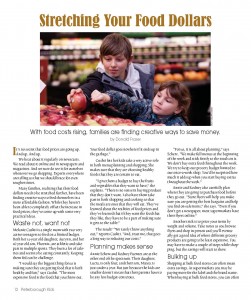Stretching Your Food Dollars: Small Print Magazine Article
 My article on rising food prices has just come out in Peterborough Kids, Lakeridge Kids, and Northumberland Kids magazines. Hit their websites to check it out.
My article on rising food prices has just come out in Peterborough Kids, Lakeridge Kids, and Northumberland Kids magazines. Hit their websites to check it out.
You can find a .pdf of it by clicking on the article.
Excerpt:
It’s no secret that food prices are going up. And up. And up.
We hear about it regularly on newscasts. We read about it online and in newspapers and magazines. And we sure do see it for ourselves whenever we go shopping. Experts everywhere are telling us that we should brace for even tougher times.
Many families, realizing that their food dollars need to be stretched further, have been finding creative ways to feed themselves in a more affordable fashion. While they haven’t been able to completely offset the increase in food prices, they’ve come up with some very practical ideas.
Waste not, want not
Melanie Jacobs is a single mom with two very active teenagers to feed on a limited budget. Both her 14-year old daughter, Aurynn, and her 16-year old son, Phoenix, are athletic and take part in multiple sports. They burn a lot of calories and seem to be eating constantly. Keeping them fed can be challenge.
“I would say the biggest thing for us is making sure they are getting food that is both healthy and fun,” says Jacobs. “The most expensive food is the food that you throw out. Your food dollar goes nowhere if it ends up in the garbage.”
Jacobs lets her kids take a very active role in both menu planning and shopping. She makes sure that they are choosing healthy foods that they are certain to eat.
“I give them a budget to buy the fruits and vegetables that they want to have,” she explains. “There is no sense in buying produce that they don’t want. I also have them take part in both shopping and cooking so that the meals are ones that they will eat. They’ve learned about the realities of food prices and they’ve learned that if they want the food that they like, they have to be a part of making sure it gets to the table.”
The result? “We rarely throw anything out,” reports Jacobs. “And, trust me, that goes a long way to reducing our costs.”
